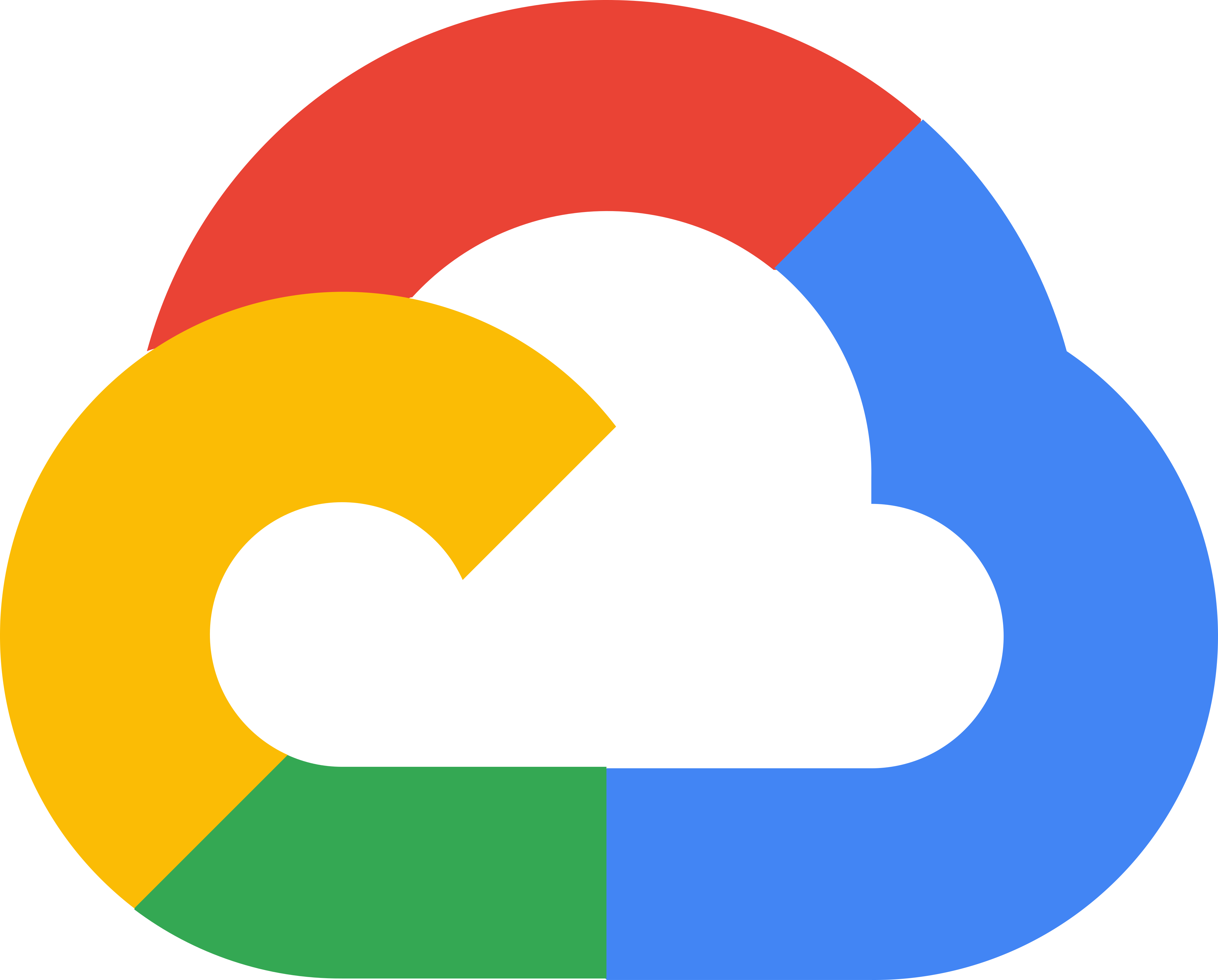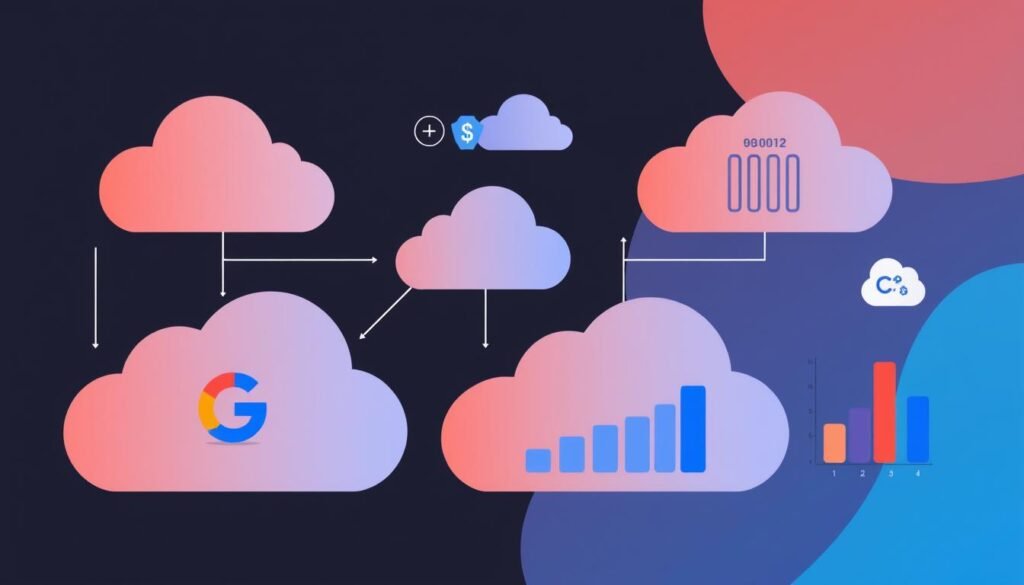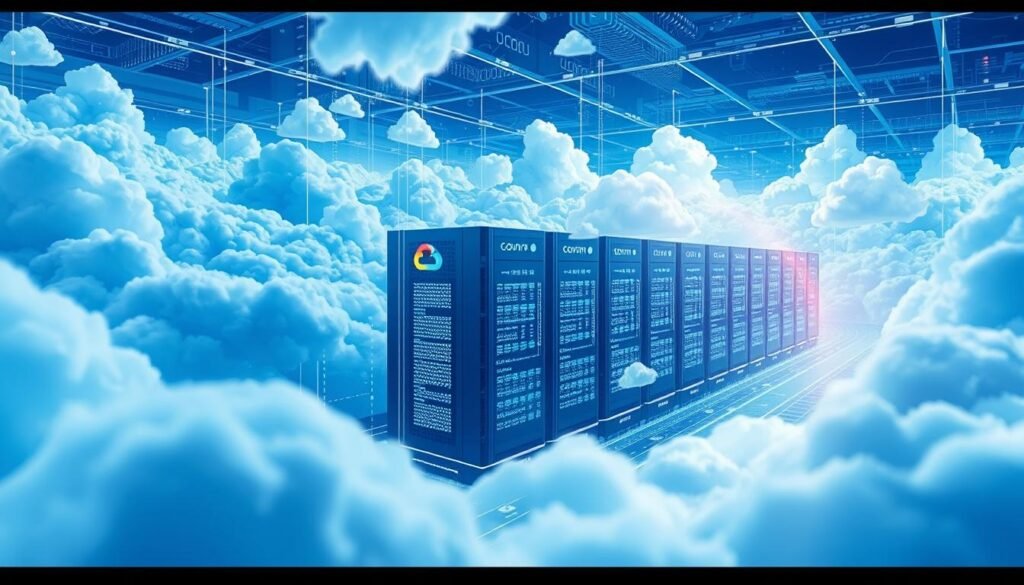
Table of Contents
Cloud computing has changed the game for businesses, making them more agile and innovative. Google Cloud Platform (GCP) is at the forefront of this change. But what makes GCP special, and how can it help your business grow? Let’s dive into the world of Google Cloud to find out.
Key Takeaways
- Google Cloud offers a wide range of cloud computing services catering to various business needs.
- Google Cloud provides generous credits and cost-saving opportunities for startups and businesses.
- Users find Google Cloud to be user-friendly, with praise for its scalability, stability, and pay-as-you-go model.
- Google Cloud is recommended for businesses seeking a robust, cost-effective, and versatile cloud computing platform.
- Google Cloud emphasizes open-source, hybrid, and multicloud solutions, enabling businesses to avoid vendor lock-in and accelerate development.

Google Cloud offers robust, scalable solutions for businesses of all sizes, enabling innovation through powerful cloud services.
Key Feature: Advanced AI and Machine Learning integration
Introduction
Cloud computing has opened a new way of utilizing computing resources. In turn, the Google Cloud Platform is at the center of such change in industries. It contains a range of cloud-related service packages from Google. GCP has cloud infrastructure, software, and tools for individuals and businesses to utilize cloud services.
What is Cloud Computing?
Clouding computing is about accessing computing services via the internet. This is inclusive of, servers, storage, databases, and more. It assists companies to develop quicker and have the ability to utilize the resources in a different way, so this controllable by all sizes of companies.
Google’s Transformative Role in Cloud Computing
Google’s cloud services are performed using the same framework that its familiar products, such as Google Search and YouTube, operate under. GCP, which was launched in 2008, has so far incorporated many services. These are in computation, data storage, networking, and so on. Languages such as C++ and Python are available for developers who wish to interact with the platform.
Wrapping it up, cloud computing cuts across technology barriers, enabling users to easily adopt new technology such as artificial intelligence. It is making the approach of running businesses all over the world different.
“Cloud computing is advancing due to its improved manageability, quick speed, and low maintenance requirements.”
Key Features of Google Cloud Platform
Google Cloud Platform (GCP) is notable for its concurred and comprehensive features for cloud computing users. The compelling reason for cloud usage is the ability to distribute and customize computing power, especially for resource allocation management.
Scalability and Flexibility
GCP enables users to easily scale their businesses up and down according to their needs. This flexibility is indeed a great way of using resources properly and saving money. For example, you are really given the chance to add or remove virtual machines quickly through Compute Engine based on the workloads you experience. The Kubernetes Engine also automates the scaling and management of containerized apps, which also helps a lot.
Cost Management
GCP has transparent and flexible pricing in which they can select a pay-as-you-go model. You’re paying only for the services you use. The billing of the service depends on the type of instances, their settings, and the duration they were used. There are also money-saving features on GCP, such as sustained use discounts, preemptible instances, and committed use discounts.
Security and Compliance
The protection of both data and applications is key towards fulfilling the goals of GCP. Security of GCP is realized through tools like encryption at rest and in transit, identity and access management (IAM), and compliance with various industry standards. Google’s global security is what guarantees that applications and data are secure. For instance, IAM allows you to determine who has the privilege to use your resources, therefore, your data is kept out of harm’s way.
“Google Cloud Platform’s scalability, flexibility, and cost optimization features make it a compelling choice for businesses seeking to harness the power of cloud computing.”
Google Cloud’s Global Infrastructure
The Google Cloud Platform (GCP) operates a number of interlinked data centers and numerous regions. It enables users to place applications closer to their users to optimize performance and access them quickly. The regions of GCP are composed of zones linked together by fast and dependable networks. Deployment of applications in many zones and regions is encouraged by Google for better availability.
Whether it owns or leases, GCP ensures that these data centers provide the same quality performance, security, and reliability. Focusing on infrastructure architecture and cloud data centers, has contributed to GCP appealing to users for their computing needs.
| Region | Availability Zones | Launch Year |
|---|---|---|
| Berlin, Germany | 3 | 2023 |
| Doha, Qatar | 3 | 2024 |
| Dammam, Saudi Arabia | 3 | 2024 |
| Johannesburg, South Africa | 3 | 2023 |
Google Cloud is growing with new regions in 2023 and 2024. This means customers get more options and better reach to their users. This shows Google Cloud’s dedication to top-notch cloud infrastructure architecture and cloud data centers worldwide.
“Google Cloud’s network spans over 3.2 million kilometers of terrestrial and subsea fiber, which is 10 times the reach of the next leading cloud provider.”
Google Cloud’s vast google cloud global network supports many products and services. These include Compute Engine, App Engine, Cloud Storage, and more. Customers in North America, South America, Europe, Asia, the Middle East, and Australia can use these services.
Pricing and Cost Optimization Strategies
On top of that, it can be noticed that the Google Cloud Platform (GCP) operates within a price range that allows flexibility. It is only the amount of resource that a user has utilized that the user will be charged for. The pricing can be complicated due to the existence of other underlying services such as virtual machines, data storage, and many others. Also, in a few cases, people have to pay for data transfer and networking in addition to using GCP facilities such as databases and AI.
As for GCP, the free usage is available for exploration with some limits in resources. When you exceed these limits, you are charged on a regular basis as any other user.
Understanding GCP Pricing Models
There are three pricing models in GCP: Free Tier, On-Demand, and Long-Term. The on-demand model charges $24.80686 monthly for virtually central processing units, and memory goes for $3.32515 per gigabyte. The C3 Standard Machine Types hourly rates range from $0.208808 to $2.296888 per hour.
Long-Term Pricing gives a discount of 20% to 79% and 100% to 90%. These discounts are determined by the length of your commitment and the suitability of use of the services.
Strategic Cost Management on GCP
If you want to cut spending on GCP, you should model your solutions first and check prices before deploying them first. Carefully plan your spending and do the right things with the cost tools. Your GPU quota, on a first-come-first-serve basis, and use of pre-emptible VMs can help you save a significant amount.
It is of paramount importance to acknowledge the amount of money you spend on Google Cloud. The main help is to find them money-saving opportunities and avoid breaking the budget. They can use one token for both services, reducing the time, and eventually the cost of operation. Partnering with certified solution providers and organizations or cost optimization firms will help you save money and use it wisely on GCP.

Creating a cost model is key for businesses in the cloud. Using standardized processes and automation tools like Terraform helps follow cost-saving strategies. Regularly checking usage trends and making forecasts helps manage GCP pricing and cloud pricing models well.

GCP offers flexible pricing: Free Tier, On-Demand, and Long-Term discounts up to 90%.
Learn More on Google CloudSpotlight on Google Cloud Services
Google Cloud Platform (GCP) is a cloud computing service that provides many features for computational, storage, databases, machine learning, and analytics. These uses of cloud technology are crucial for businesses to innovate and expand.
Compute Services
The Compute Engine which is at the heart of GCP’s compute services, along with the Kubernetes Engine is the whole process through which the users can scale the virtual machines and manage them without any hassle. Kubernetes Engine is another name for the part that manages containers; thus, the system becomes a much friendlier alternative to bigger workloads. All these services are problem solver for businesses where they need such flexible and scalable cloud solutions
Storage Solutions
Storage services refer to the one related to the storage needs of a data. Cloud Storage is a RESTful agent that takes care of storing data and accessing it. Persistent disk provides quick block storage, whereas the cloud Filestore offers shared file storage on any scale. These storage choices help in securing the data and also reach the data quickly.
Databases and Data Analytics
Storage Services are a portfolio of several that gives a variety of solutions for data; however, the choice is determined by technological preference and specific data requirements. Cloud Storage for locally saving data in the cloud, Snowball Edge for copying data to the cloud, and Mobi for transferring data between cloud and on-prem storage. Many of these options need to be used for the specific solution or to have many of them in experiments for the best solution. BigQuery’s datawarehouse technology is used to process and analyze large datasets, such as ad hoc queries, real-time query performance, and predictive modeling. For deep analytics, AI Platform allows you to create and deploy machine learning models, which help you get a lot of knowledge out of the data.
In this way, Google Cloud Platform enables businesses to be present on the web, allowing them to utilize the services of GCP to increase business efficiency, discover new opportunities, and make informed decisions by processing and analyzing data.
| Service | Key Features | Use Cases |
|---|---|---|
| Compute Engine | Scalable and flexible virtual machines, optimized resource utilization | Web servers, application hosting, batch processing |
| Kubernetes Engine | Robust container orchestration, enhanced scalability and resource management | Containerized applications, microservices, scalable workloads |
| Cloud Storage | Highly scalable and durable object storage, RESTful API access | Media storage, data backup and archiving, content delivery |
| BigQuery | Serverless data warehouse, fast and scalable data processing and analytics | Business intelligence, real-time analytics, ad-hoc queries |
| AI Platform | Comprehensive platform for building and deploying machine learning models | Predictive analytics, image recognition, natural language processing |
“Google Cloud Platform provides a robust set of services that enable businesses to harness the power of the cloud and drive innovation. Its compute, storage, and data analytics offerings are cutting-edge, empowering organizations to optimize their infrastructure, unlock valuable insights, and stay ahead of the curve.”
Google Cloud: Exploring Cloud Computing
The Google Cloud Platform (GCP) is a top cloud computing service. It has many advanced technologies and solutions for businesses of all sizes. GCP gives a strong and growing infrastructure. This helps organizations use the cloud’s power and change digitally.
GCP focuses on scalability and flexibility. Companies can easily change their computing resources as needed. This ensures they work well and save money. GCP also has cost management tools. These help businesses control their cloud costs and get the most from their money.
Security and following rules are very important in cloud computing. GCP does great in these areas. It has strong security measures and follows industry standards. This gives companies the confidence to keep their important data and apps in the cloud.
| Key Metric | Value |
|---|---|
| Google Cloud Employees | 37,000 (as of Q2 2021) |
| Google Cloud Revenue | $4.63 billion (Q2 2021) |
| Overall Rating | 4.5/5 on Gartner Peer Insights, 4.7/5 on Capterra |
| Compute Engine Rating | 8/10 on TrustRadius, 4.4/5 on G2 |
The Google Cloud Platform has gotten great reviews. Users like its performance, reliability, and wide range of services. With its global setup, new technologies, and focus on customer success, GCP is a top cloud computing choice. It helps businesses move forward with their digital plans.

Networking and Content Delivery on GCP
Google Cloud Platform (GCP) has a wide range of networking services. These services help with connecting and delivering content for apps and workloads. They work together to make sure networks are fast, reliable, and secure in the GCP world.
Cloud CDN: Caching and Delivering Content Closer to Users
Cloud CDN is a key service in GCP. It helps cache and deliver content closer to users for better performance and less delay. It uses external Application Load Balancers to serve content, offering many backend options like instance groups and serverless NEGs.
To make content delivery better, it’s smart to cache static content and use custom cache keys. Enabling HTTP/3 and QUIC protocols also helps. Negative caching is good for managing common errors, which cuts down on origin load and speeds up responses.
Cloud Load Balancing: Scaling and Managing Traffic
Cloud Load Balancing is vital in GCP. It helps scale and manage traffic across many instances or regions. This service spreads out incoming requests, making sure apps are always available and handling big traffic increases.
Using Cloud CDN with Google Cloud Armor boosts web app security. It protects against different online threats and attacks.
GCP’s networking and content delivery features give businesses a full solution for better app performance, scalability, and security in the cloud.
| Feature | Description |
|---|---|
| Cache Modes | Automatically cache common static content types with new cache mode options |
| Cache TTL Settings | Ability to set and/or override cache TTLs for fine-tuning caching responses |
| Custom Response Headers | New feature to reflect cache status to clients and include geographic data |
Google is always growing its global network and improving its gcp networking services. Soon, Cloud CDN will have new features like serving stale content and negative caching.
Artificial Intelligence and Machine Learning
Google Cloud Platform (GCP) has a strong set of AI and ML services. These help businesses use AI and ML to change the game. AI Platform is a key service that lets users easily build, deploy, and manage ML models. It offers pre-trained models and tools to create custom models with frameworks like TensorFlow and PyTorch.
GCP also adds AI and ML to many services. This lets users use advanced analytics and predictive insights to boost their businesses. For example, BigQuery ML lets data analysts use ML directly in the data warehouse. They can make models for recommendations, segmenting customers, finding anomalies, forecasting, and predicting outcomes.
Using GCP AI and GCP machine learning has many benefits. It makes ML accessible to everyone, helping businesses find new insights. This leads to better predictions, identifying new customers, and giving personalized advice. The cloud AI platform on GCP also saves time by not needing to set up complex infrastructure. This lets companies focus on creating new AI solutions.
| Service | Capability | Benefit |
|---|---|---|
| AutoML Vision | Reduces the need for human review in nearly half of inspection images | Streamlines quality control and inspection processes |
| AutoML Tables | Achieves 150% more subscribers per dollar spent and 140% user engagement for marketing programs | Drives customer acquisition and engagement through predictive analytics |
| Dataflow | Allows data engineers to use TensorFlow Extended (TFX) for building and managing ML workflows in production | Simplifies the operationalization of ML models at scale |
The power of GCP AI and GCP machine learning is growing. Businesses in all industries are set to gain huge efficiency, innovation, and a competitive edge. They will unlock new levels of performance by using these technologies.
Developer Tools and Serverless Computing
The Google Cloud Platform (GCP) has many tools and serverless solutions for teams. These help teams focus on new ideas, not on managing servers. Cloud Functions and Cloud Run are two key tools in this area.
Cloud Functions: Event-Driven Serverless Code
Google Cloud Functions lets developers write code that runs without servers. It works with many triggers like HTTP requests, cloud storage events, or Pub/Sub messages. With gcp serverless Cloud Functions, teams can make and use microservices easily. They don’t have to worry about the server setup, so they can focus on the code.
Cloud Run: Managed Serverless Containers
Cloud Run goes further with serverless by offering a place to run apps in containers. Developers can upload their cloud functions or apps in containers. Then, Cloud Run takes care of setting up, scaling, and managing the servers. This saves time and lets teams focus on more important tasks.
These tools from GCP help developers make and launch new apps quickly and easily. They don’t need to deal with complex server setups. By using gcp serverless, cloud functions, and cloud run, teams can focus on what they’re best at. This leads to better digital experiences for customers.
Hybrid and Multi-Cloud Integration
Businesses today face a changing cloud computing world. They need to blend on-premises setups with cloud services smoothly. Google Cloud Platform (GCP) offers strong hybrid and multi-cloud options. This lets companies use cloud benefits while keeping control over their IT.
GCP’s hybrid cloud solutions let businesses link their on-premises data centers with cloud services. This ensures data and apps move securely and efficiently. It helps companies optimize their IT, picking the best cloud services for their needs while following industry rules and keeping data safe.
Also, GCP supports a multi-cloud strategy. This means businesses can use resources from different cloud providers like Amazon Web Services (AWS) and Microsoft Azure. This strategy helps companies spread their cloud use, avoid being tied to one provider, and use the strengths of various cloud platforms.
To make multi-cloud use smooth, GCP offers many ways to move data between its platform and others. Options include public IP addresses, managed VPN services, and more. Each method has different speeds, reliability, and costs. This lets businesses pick the best fit for their needs.
By using gcp hybrid cloud and gcp multi-cloud strategies, companies can make the most of their cloud investments. They ensure cloud integration between on-premises and cloud setups. This approach helps businesses innovate, work better, and keep data safe and secure.
| Key Benefits of Hybrid and Multi-Cloud Integration | Adoption Trends |
|---|---|
|
|
By embracing gcp hybrid cloud and gcp multi-cloud strategies, companies can enter a new era of cloud-powered innovation. They ensure smooth cloud integration across all their environments.

Use Cases and Target Audiences
Google Cloud Platform (GCP) is great for many users and industries. Database managers use it for secure, fast, and reliable databases. Businesses looking for a scalable platform for more work find GCP perfect.
Web developers with big websites like GCP for its cost-effective and customizable hosting. Data analysts use it for its data analytics and interoperability. Users unhappy with other cloud platforms like GCP for its easy use and good prices.
GCP has many services and flexible pricing. It’s good for small startups and big companies. It helps you meet your cloud computing needs and grow your business.
| Use Cases | Target Audience |
|---|---|
|
|
GCP is great for all kinds of organizations. It meets the needs of database managers, businesses, web developers, data analysts, and those unhappy with other cloud platforms. Its many services and flexible pricing make it a top choice.
Conclusion
Google Cloud Platform (GCP) is a top-notch cloud computing provider. In addition to the broad array of services and business tools, Google Cloud Platform (GCP) provides a lot of features and tools for businesses of all sizes. Among them are flexible scaling, policy-based cost management, and robust security.
GCP has a network of advanced AI and machine learning and a global network that helps businesses build, optimize processes, and achieve their objectives. Web developers, and data analysts are some of the other specialists who can benefit from this service besides database managers.
Google Cloud kept on being enhanced using open-source collaboration, better cybersecurity, and AI innovation. Through the Google Cloud, the official can enjoy the advantages of GCP cloud computing. They can scale up and transform themselves while still using the platform’s robust GCP summary.

GCP offers flexible scaling, AI-driven innovation, and top-tier security for businesses of all sizes.
Discover Google Cloud